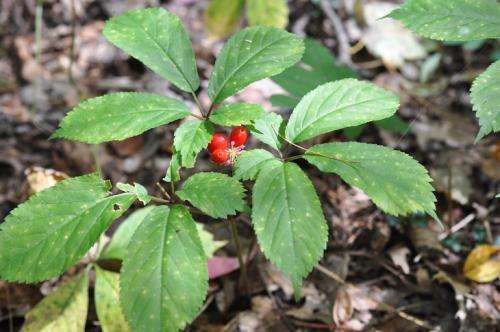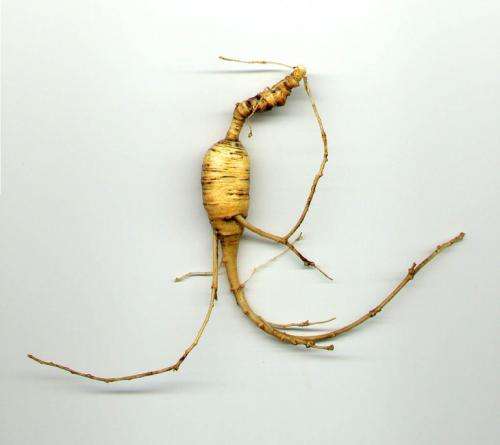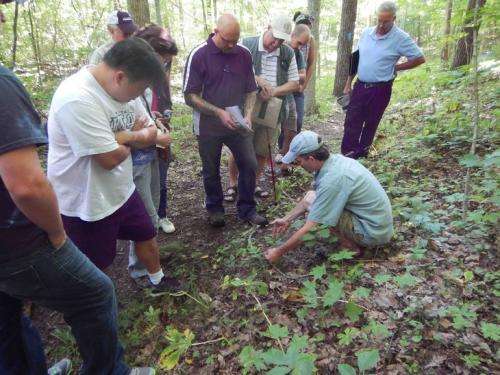Plant scientist works with landowners, law enforcement to protect ginseng

American ginseng is disappearing from the forests of Pennsylvania and Appalachia, and a Penn State plant scientist is working with landowners and law enforcement to try to reverse that trend.
Wild American ginseng, native to the East and Midwest, is prized for its medicinal value and commands a premium price in Asia—as much as $1,000 a pound. Thefts and unsustainable harvesting of the forked, fleshy root have been on the rise since ginseng has been featured on two national reality television series, "Appalachian Outlaws" and "Smoky Mountain Money."
Eric Burkhart, plant science program director at Penn State's Shaver's Creek Environmental Center, is working to encourage private forestland owners to cultivate ginseng. He was recently awarded a grant by the Pennsylvania Department of Conservation and Natural Resources to continue his work surveying growers and setting up monitoring sites for the state's remaining wild ginseng on public lands.
Burkhart is also helping train state law enforcement, providing them with information on the plant's biology and ecology, the ginseng industry and markets, and applicable state and federal codes and regulations.
"There's a really big knowledge gap in the law enforcement community as to how to respond when it comes to ginseng theft from private and public forestlands," Burkhart said.
Ginseng conservation
Eric Burkhart, plant science program director at Penn State's Shaver's Creek Environmental Center, hopes to encourage private forestland owners to cultivate ginseng on their lands using a sustainable cropping system. Burkhart is working with the state DCNR to track and manage ginseng, and also working with PA Certified Organic to develop a new "forest grown" labeling program for ginseng.

Ginseng has been harvested in Appalachia and sold for export since the 1700s. The unassuming root is protected by the CITES (Convention on International Trade in Endangered Species of Wild Fauna and Flora), but gets less attention from the public than animals on the list, such as the African elephant or American black bear. "If you've got something warm and fuzzy people tend to get much more concerned," Burkhart said.
Publicity from the reality shows have put attention and pressure on the plant like never before, Burkhart said. "There's no doubt that what we have left is a fraction of what existed at one time due to the continuing impacts of habitat loss and wild harvesting."

"The time has come to transition from harvesting wild ginseng to cultivating ginseng on private forestlands, creating economic opportunities for landowners while taking the pressure off the remaining wild populations," he said.
Provided by Pennsylvania State University

















